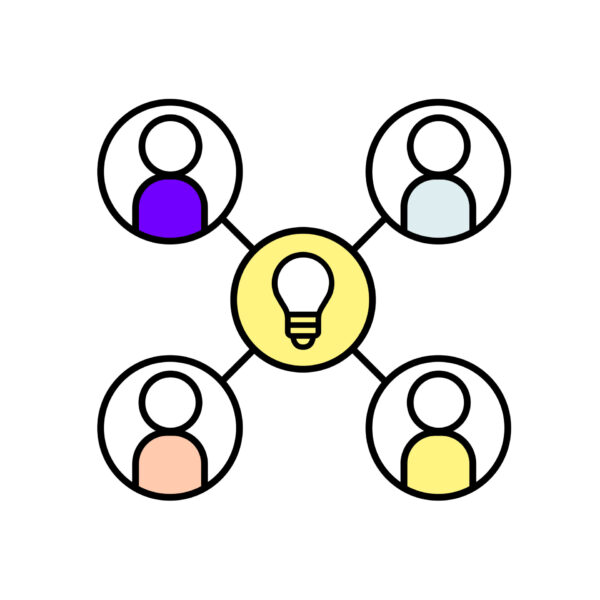
Complete a survey for Dr Fiona Wu
Complete a survey to help Dr Fiona Wu understand people’s views on the use of artificial intelligence (AI) in Multi-Disciplinary Team (MDT) decision-making and potential changes to MDT processes in healthcare.
Our Research Involvement Network (RIN) is a group of people who each have a personal connection to pancreatic cancer, through being patients, carers, loved ones or survivors.
Being a part of our RIN gives you the opportunity to help shape pancreatic cancer research. It connects you to the exciting and important changes happening in pancreatic cancer research, gives you the opportunity to meet researchers and help us determine which research we should support with the funds raised by our supporters.
Within our RIN, each member has unique experiences of pancreatic cancer diagnosis, treatment and care and this is your lived experience. These diverse insights can help pancreatic cancer researchers shape their work to ensure it is relevant to people affected by pancreatic cancer.
I became involved with the Research Involvement Network to help Pancreatic Cancer UK to both find a way to detect this insidious disease early and to also find a way to cure it. If I can help in this small way, I will do it in memory of the man I loved and lost to pancreatic cancer, in the hope that others don’t suffer in the same way.
Involving people with lived experience at all stages of the research process ensures that the research being conducted is relevant to the needs of people affected by pancreatic cancer.
This means moving beyond thinking of people with lived experience as participants in a study, but as partners in setting research priorities, recommending the research that should be funded and guiding researchers with their work.
As a member of our RIN, you can share your experiences to inform and influence research projects. Research ideas which have been informed by lived experience are not only more likely to be more relevant to clinical practice; they are also more likely to be awarded funding.
To join our RIN, you will need to complete a short application form which will ensure you receive our monthly RIN email bulletin.
At the beginning of each month the Research Team will send the bulletin to RIN members which includes the latest opportunities to get involved in pancreatic cancer research. This can include any researcher who is undertaking a project in pancreatic cancer research, not just our current grant holders or researchers applying to our funding schemes.
The bulletin may also contain news and research updates as well as examples of ways our RIN are shaping pancreatic cancer research.
You are welcome to sign-up to any opportunities which you are interested in, and you can choose the time and opportunity which works best for you.
All these opportunities draw upon your unique experiences as someone affected by pancreatic cancer.
You can share as much or as little of your personal experience as you feel comfortable doing. You do not need to have a research or scientific background to be a member of RIN.
Researchers may ask you to comment on documents to ensure that they can be understood by their intended audience. These documents can range from project summaries in a grant application to information leaflets for a clinical trial.
Pancreatic Cancer UK run various grant funding rounds and we ask our Research Involvement Network to review the applications received from researchers to ensure they are relevant to people affected by pancreatic cancer.
Focus groups consist of a small group of individuals with lived experience along with a researcher. They are opportunities to find out more about a project, ask questions of the researcher and for the researcher to hear what you think about their project based on your personal experiences. They are a great way to stimulate discussion on a research project and can be virtual or in person.
Researchers may want the voice of lived experience to be involved for the duration of their project. This would involve attending meetings to discuss the progress of the project and commenting on the next steps.
Researchers may want opinions or answers to specific questions to help shape their research.
Researchers may want to share their research results with people affected by pancreatic cancer and invite individuals to their research facilities.

Complete a survey to help Dr Fiona Wu understand people’s views on the use of artificial intelligence (AI) in Multi-Disciplinary Team (MDT) decision-making and potential changes to MDT processes in healthcare.

Dr Phillipa Lally and Sairah Bi have co-designed a programme combining physical activity, self-compassion and social support to improve body image in young adults aged 18–39 living with or beyond cancer.

Dr Olivia Smith's project will assess differences in mood and quality of life symptoms according to pancreatic ductal adenocarcinoma stage and its treatment in UK patients.

Professor Anguraj Sadanandam and Dr Christophe Cisarovsky are creating the first map of blood vessel types in rare pancreatic tumours, showing how vessel differences shape tumour behaviour and response to treatment.

Dr Nathaniel Yilmaz from Pioneuro Biosciences present ANCHOR-PDAC. This project explores a new strategy to stop pancreatic cancer from spreading, aiming to transform aggressive disease into a controllable and potentially curable condition.

Professor Wafa Al-Jamal from the University of Belfast is investigating a new method to reawaken the immune system and help make immunotherapy to be more efficient against pancreatic cancer.

Professor Anguraj Sadanandam and Dr Chanthirika Ragulan are testing programmable, tumour-homing bacteria that selectively remodel the dense stroma of pancreatic cancer, reducing tissue stiffness and restoring blood flow to make immunotherapy effective

Dr Yuta Ikami aims to understand why pancreatic cancer resists treatment by studying how different cancer cell types interact with the cells around them to find new weaknesses that could lead to more effective therapies.

Dr Matthew Walker from the University of Glasgow is investigating how the underlying mechanics of pancreatic tissue can change during pancreatitis and how this can influence cell behaviour, revealing new diagnostic and therapeutic targets in early pancreatic cancer.

Cure51 studies long-term cancer survivors to create a global database of their biological data. By understanding these outliers, the company aims to develop new, first-in-class cancer treatments.

Dr Peter Wan from the University of Oxford is undertaking a project which aims to create new antibody medicines that help the immune system kill both pancreatic cancer cells and the surrounding cancer-supporting cells.

Dr Ganesh Radhakrishna and Dr Raneem Albazzaz and their team aim to validate and refine the Pancreatic Cancer Reporting Template (PACT-UK) reporting tool to improve diagnostic consistency and create a national imaging biobank to support future artificial intelligence research.
If you have any questions about our Research Involvement Network, please get in touch.
The Research Team